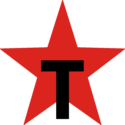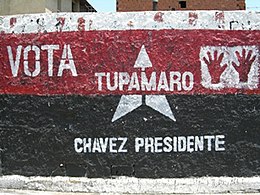Tupamaro (Venezuela)
Revolutionary Movement Tupamaro Movimiento Revolucionario Tupamaro | |
|---|---|
 | |
| Leader | Oswaldo Jiménez |
| Founded | 1992 |
| Headquarters | Caracas |
| Ideology |
|
| Political position | Far-left |
| National affiliation |
|
| Colors | Red, Black |
| Allies | |
| Seats in the National Assembly | 7 / 277
|
| Party flag | |
 | |
| Website | |
| www | |
Revolutionary Movement Tupamaro (Spanish: Movimiento Revolucionario Tupamaro, MRT), often shortened to Tupamaro, is a far-left Marxist-Leninist political party and one of the most prominent colectivos in Venezuela.[3] Several Tupamaros participate in peaceful movements while some believe the "idea of armed struggle as a means to gain power."[4] The group supports the National Liberation Army (ELN)[2] and allegedly had ties with FARC.[5]
History[]
After the end of the dictatorship of General Marcos Perez Jimenez, the Caracas area known as "el 23 de Enero" that was occupied by his wealthy officials was then taken over by poor squatters.[6] Since then, the area has been described as a "hot bed of radicalism" and that residents have "a resistance mentality".[6] When the Tupamaro in Uruguay were being targeted by the Uruguayan government, some of the Uruguayan members supposedly settled "el 23 de Enero".[6] The Venezuelan Tupamaros have at least ideological links to the Tupamaros in Uruguay that took the name of Tupac Amaru, the last Incan leader of Peru who was executed by Spanish authorities in 1572 for opposing colonial rule.[7] In the 1970s and 1980s, then future members of the Tupamaros were allegedly gaining experience by partaking in guerrilla activities and performing vigilante actions during a period of rising crime in Venezuela.[6]
Founding[]

The Tupamaros were officially founded in 1992 and allegedly had the chance in prison to come into contact with Hugo Chávez, who was imprisoned for the 1992 Venezuelan coup d'état attempts.[6] Chávez and the Tupamaros then allegedly made a deal since Chávez needed protection and the Tupamaros needed resources.[6] With emergence of Hugo Chávez as President of Venezuela consolidated its disparities in support of the then new Movement for the Fifth Republic president.[citation needed]
Nevertheless, throughout their existence, the ideological basis of the movement began to deteriorate. As it stood in the first decade of the twenty-first century denunciations of the group from many forces in the country, with respect to the conduct of this group and its members, was ever present, specifically because of alleged attacks on student movements that are not in agreement with Hugo Chávez.[7]
Leadership[]
The original leader of the Tupamaros was Jose Pinto, who was the General Secretary of the MRT.[6] Alberto "Chino" Carías is the current leader of the Tupamaros and calls himself "a Marxist-Leninist guerrilla fighter".[5] He states that he keeps contact with Carlos the Jackal and "has lost count of how many people he's murdered", saying "after ten [murders] you stop feeling remorse".[5]
Social work[]
With the emergence of Chavez as president, the group also cooperated with the state in administering social programs and promoting political participation. It is involved in after-school programs to keep children out of trouble, child care centers, puppet shows, drug rehabilitation and sports programs.[7] A Tupamaro leader known as Chino, said of the group that "Our greatest accomplishment is having been able to change things through elections."[7]
According to Dr. George W. Knox, executive director of the National Gang Crime Research Center, the Tupamaros are a "gang" and that they use claims like "helping the oppressed peoples" as a ploy that he describes as similar "to Al Capone offering free soup to Chicago's poor".[6]
Neighborhood actions[]
The group has refused to renounce use of arms to protect communities considered too dangerous even for police officers. In one such example in the high-crime 23 de Enero neighborhood in western Caracas, thieves, muggers or drug dealers who operate in the area run the risk of being executed by Tupamaros patrolling on motorcycles in death squads. A Tupamaro member known as "Mao" insisted neighbourhood criminals are given ample warning before facing execution. "First we give them a warning to get out of the area. If they don't listen, we see them again, this time with 10 of our comrades. If they fail to understand the message, we take matters into our own hands." Though, once again the masks they wear are said to ward off possible retribution from criminals, police or Chavez's political opposition, but they also reinforce an imposing image that critics call a tool of intimidation against Chavez's political opposition. Some have claimed that the Tupamaros execute such criminals because they are competition and they want to have control.[8]
Political violence[]
Luis Milan, a political science professor at Bolivarian University talked about a riot that began when police opened fire. With the arrival of more Tupamaros to the aid their comrades police, then, asked for military support, signifying the growing potency of the group. He added that "They are becoming a legitimate party, they are participating in the political process. It's a different time now."[7]
Court decisions[]
On 8 August 2002, four military officers were being tried for rebellion following the 2002 Venezuelan coup d'état attempt and the Supreme Tribunal of Justice (TSJ) delayed the trial of the officers since judges could not agree on judgements.[6][9] Following this, President Chávez gave a strong speech on Margarita Island in a "pre-April 11 fashion" calling for supporters to defend "to be ready, at all moments, to defend the Revolution against anyone" while also making statements on not putting pressure on the TSJ judgements.[9] Tupamaros then allegedly attacked a police convoy with high-caliber weapons in a slum area which left one officer dead, one injured and an additional four civilian casualties.[6] Chávez supporters also began to protest in Caracas, closing the street in front of the TSJ and burning tires and another four police officers were reported injured.[9] Tupamaros had also reportedly blocked streets and subways and began to throw Molotov cocktails at police vehicles.[6]
Elections[]
Ismach Leon, a campaign manager for the opposition party First Justice said, "The Tupamaros began following me to get me out of Coche (a Caracas slum) because I was campaigning for (conservative candidate) Julio Borges."[7]
Near the conclusion of the 2012 Venezuelan presidential election, Tupamaros leader Alberto Carías stated that if the Venezuelan opposition did not accept a "sure victory" by Hugo Chávez, "that there would 'bullets'".[5] He also stated that the group was "prepared and well armed" and would attack any opposition group that protested.[5]
Foreign diplomats[]
In April 2006 following an event where United States Ambassador William Brownfield donated baseball equipment to a poor community in Caracas, Brownfield's convoy was hit, kicked and pelted with objects.[10] The convoy was allegedly attack organized by the Tupamaros with some shouts supposedly heard at the time involving the word "Tupamaros".[6][10]
Protests[]
It was alleged that during the 2014–15 Venezuelan protests, Tupamaros worked with the Venezuelan National Guard to attack protesters that opposed the Bolivarian government.[11]
References[]
- ^ "A New Revolutionary Alternative for the People of Venezuela". 22 October 2020.
- ^ Jump up to: a b "Comunicado Del Movimiento Revolucionario Tupamaro". Colombian National Liberation Army (in Spanish). 13 March 2017. Retrieved 26 January 2019.
- ^ "Colectivos en Venezuela: ¿Organizaciones sociales o criminales?". NTN24. 8 October 2014. Archived from the original on 10 October 2014. Retrieved 9 March 2015.
- ^ Ruiz, Roger (12 February 2014). "Los Tupamaro, la fuerza de choque del chavismo". El Comercio. Retrieved 8 May 2014.
- ^ Jump up to: a b c d e Benedetti, Ana María (6 October 2012). "Venezuela: radical group promises violence if Chávez loses election". ABC News. Retrieved 9 March 2015.
- ^ Jump up to: a b c d e f g h i j k l W. Knox, George. "The Tupamaro gang of Venezuela". National Gang Crime Research Center. Retrieved 9 March 2015.
- ^ Jump up to: a b c d e f "Venezuela's Tupamaros on the side of the law". Sfgate.com. 16 November 2008. Retrieved 2 December 2013.
- ^ "Los Tupamaros, el brazo armado del chavismo". Infobae. 13 February 2014. Retrieved 7 August 2014.
- ^ Jump up to: a b c "Political update II: August 8, 2002" (PDF). United States Department of State. Archived from the original (PDF) on 28 November 2010. Retrieved 9 March 2015.
- ^ Jump up to: a b "Pelting of U.S. ambassador's car in Venezuela draws strong gov't response". Fox News. 6 April 2006. Retrieved 9 March 2015.
- ^ "Venezuela: Así actúan Tupamaros con protección del chavismo". Peru 21. 22 February 2014. Retrieved 8 May 2014.
- 1992 establishments in Venezuela
- Bolivarian Revolution
- Crisis in Venezuela
- Communist militant groups
- Communist parties in Venezuela
- Marxist parties
- Political parties established in 1992
- Political parties in Venezuela
